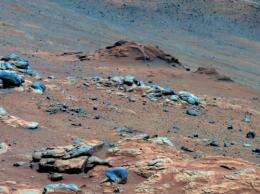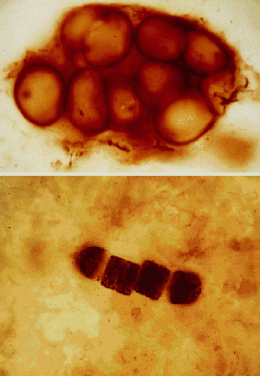Colonization of Mars might be microbes away

Tiny rock-eating microbes could mine precious extraterrestrial resources from Mars and pave the way for the first human colonists. Just don't expect them to transform the red planet's surface into a new Earth on a short deadline, researchers say.
One of the most promising planetary colonizers comes in the form of cyanobacteria. The ancient bacteria helped create a habitable Earth with oxygen at least 2.5 billion years ago, and have since colonized practically every possible environment while relying upon photosynthesis to convert sunlight into energy.
Cyanobacteria and other rock-dwelling microbes also have proven that they can survive the hard vacuum of space aboard facilities such as Europe's BIOPAN exposure platform and the International Space Station's EXPOSE platform. Only the harsh space radiation in low Earth-orbit presents a life-threatening problem for the hardy organisms.
"They’re quite capable of tolerating extreme conditions," said Charles Cockell, a geomicrobiologist at The Open University in the UK. "But we were surprised at their abilities to tolerate some conditions such as vacuum."
Fortunately, cyanobacteria won't have to endure quite such harsh conditions on Mars.
Mining extraterrestrial rocks
We already use microbes to help extract materials on Earth, including over 25 percent of the world's copper supply. Microbes could serve a similar purpose on other planets to mine resources, save on rocket fuel needed to launch such resources from Earth, and perhaps make a human base more self-sustaining, Cockell said.
He and a colleague, Karen Olsson-Francis, first wanted to see how well cyanobacteria could deal with rocks found on the Moon and Mars. They tested several types of cyanobacteria for a study detailed in the August issue of the Journal Planetary and Space Science.
A microbe known as Anabaena cylindrica stood out as the clear winner on all different rock types, including those with both high and low silica content. It also survived up to 28 days of exposure to dry conditions under the Mars scenario.
But the silica content in the rocks made a big difference in the growth rates of all the cyanobacteria types - rhyolite rock with higher silica content slowed growth significantly. The high silica content also hampered the ability of the microbes to break down the rock and release useful elements or nutrients.

Still, the microbes did fine breaking down basaltic rock similar to volcanic rock on the Moon and Mars, as well as anorthosite rock similar to lunar regolith. That suggests cyanobacteria could work well alongside plants for in-situ resource utilization on extraterrestrial surfaces.
"Humanity has been completely linked into the microbial world, so it’s logical we would continue that relationship with microbes as we go into space," Cockell said. "The question is how we can most productively optimize them going into space."
Surviving the surface
Cockell pointed out other ways microbes can help open up space as a new frontier, in a review for the August issue of Trends in Microbiology.
Some microbes can make oxidized iron from reduced iron in pyrite ore, and also create sulfuric acid that further breaks down rock. One acid-loving, iron-oxidizing microbe proved capable of perhaps using material from a Murchison meteorite, according to a 2009 study by Gronstal and colleagues.
Microbes might even help deal with the menace of lunar dust or Martian dust storms to humans and robots alike. A 2008 study by Liu and colleagues showed how artificially seeding the desert sands of Inner Mongolia with cyanobacteria created a strong crust within 15 days. Such crusts also proved capable of surviving wind that reached speeds of almost 33 feet per second (10 meters per second).
Researchers also have begun experimenting with microbial fuel cells that might someday help produce methane fuel from carbon dioxide and hydrogen on the Martian surface.
But none of this marvelous microbial activity would likely take place under exposed surface conditions on the moon or Mars. Instead, the microbes would do their work inside protected bioreactors or similar facilities, Cockell explained.

"I suspect you could use them under greenhouse conditions,” Cockell said. He added that some slow-growing varieties of cyanobacteria had trouble even under optimal lab conditions.
Changing the surface
That word of warning may seem to put a damper on hopes that microbes could become the vanguard for transforming Mars into a lush green and blue planet. But researchers still have tried to envision how microbes could help terraform the red planet.
Humans might first need to push Mars into a state known as ecopoesis. Geoengineering might help raise the surface temperature by 60 degrees C so that liquid water can exist once more on the Martian surface, as well as thicken the atmosphere and reduce the amount of ultraviolet radiation and cosmic rays that reach the surface.
But Cockell remained cautious about the likelihood that microbes could make Mars habitable for humans in a relatively short period of time.
"Terraforming is more difficult because you’re trying to change planetary conditions on a short timescale," Cockell pointed out. "It took hundreds of millions of years to do it on Earth."
That doesn't mean humans might not engineer a super-variety of microbe that might do the trick down the line, Cockell said. But his interest remains focused on the more practical application of harvesting resources, and continuing to test how well different microbes deal with the wide variety of extraterrestrial rocks.
Another exciting possibility may arise from how well microbes cooperate together on doing their job.
"One thing we really don’t understand is whether we can use a community of organisms to improve extraction from rocks," Cockell said.
Source: Astrobio.net, By Jeremy Hsu




















